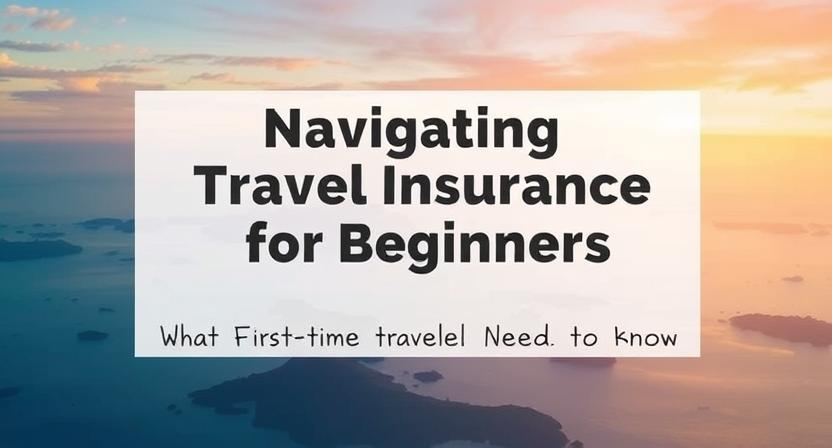Traveling abroad for the first time is an exciting and transformative experience. Whether you’re visiting new destinations, experiencing different cultures, or embarking on an adventure of a lifetime, there’s much to look forward to. But as with any big trip, it’s essential to be prepared for the unexpected. One critical aspect that first-time travelers often overlook is travel insurance.
While it may seem like an unnecessary extra expense, travel insurance is one of the smartest decisions you can make when planning a trip, especially if you’re traveling internationally. The right insurance can protect you from a wide range of potential problems—everything from medical emergencies to lost baggage and trip cancellations. Understanding the ins and outs of travel insurance is key to ensuring a smooth, worry-free travel experience.
In this article, we’ll walk you through everything you need to know about travel insurance as a first-time traveler, from what it covers to how to choose the right policy for your trip.
1. What is Travel Insurance and Why Do You Need It?
Travel insurance is a policy that provides coverage for a variety of potential risks that can arise before or during your trip. This can include medical emergencies, trip cancellations, delays, lost baggage, and even situations like natural disasters or political unrest. For first-time travelers, the peace of mind that comes with knowing you’re covered in case of an emergency is invaluable.
The cost of travel insurance varies depending on factors such as the length of your trip, your destination, the type of coverage, and the level of protection you need. While it might seem like an added expense, the protection it offers is often well worth the investment.
2. Types of Travel Insurance Coverage
When purchasing travel insurance, it’s essential to understand the different types of coverage available to you. Depending on your trip and personal preferences, you might need one or more of the following options:
a. Trip Cancellation/Interruption Insurance
This type of insurance is designed to protect you if you need to cancel your trip before departure or cut your trip short due to unexpected circumstances. For example, if a family emergency arises or you fall ill just before your planned departure, trip cancellation insurance can reimburse you for non-refundable costs like flight tickets, hotel reservations, and tour bookings.
Trip interruption coverage also comes into play if you have to end your trip early due to a covered reason, such as a medical emergency, a death in the family, or a natural disaster. This can help cover the costs of returning home early and any lost trip investments.
b. Medical Coverage and Emergency Evacuation Insurance
One of the most crucial aspects of travel insurance for first-time travelers is medical coverage. Many domestic health insurance policies offer limited or no coverage for medical expenses outside of your home country. Without travel insurance, you could be left with massive out-of-pocket costs if you fall ill or get injured while abroad.
Medical coverage typically includes emergency medical treatment, hospitalization, doctor’s visits, and prescription medications. For travelers venturing to destinations with high healthcare costs (such as the United States), this coverage is especially important.
In addition to medical coverage, emergency evacuation insurance is vital for more serious medical emergencies. If you are injured or become ill in a location with inadequate medical facilities, emergency evacuation coverage will cover the cost of transporting you to a medical facility in a better-equipped location, potentially saving your life.
c. Lost or Delayed Baggage Coverage
It’s a common travel nightmare—arriving at your destination only to find that your luggage didn’t make it. Lost, damaged, or delayed luggage can cause significant inconvenience, especially if you’re on a tight schedule or carrying important items.
Many travel insurance policies include coverage for lost baggage, ensuring that you are reimbursed for the cost of replacing essential items like clothing, toiletries, or electronics. In the case of delayed baggage, insurance may also cover the cost of necessary purchases until your luggage is returned.
d. Travel Delay Coverage
Delays are inevitable in the world of travel, and they can be incredibly frustrating—especially if your flight is delayed for an extended period. Travel delay coverage can help cover the costs of meals, accommodations, and transportation during these unexpected delays.
For instance, if you’re stuck in an airport overnight due to a weather-related flight delay, this coverage ensures that you won’t have to pay for lodging and meals out of pocket. This can be particularly helpful if you’re traveling internationally and dealing with unfamiliar situations.
e. Accidental Death and Dismemberment (AD&D) Coverage
While it’s not something most travelers want to think about, accidents can happen. AD&D coverage provides a benefit to you or your beneficiaries in case of a fatal accident or loss of a limb or other body parts during your trip. It’s a small but important feature that can offer financial protection in a worst-case scenario.
3. What Isn’t Covered by Travel Insurance?
While travel insurance provides valuable protection, there are some exclusions and limitations that you should be aware of. Typically, travel insurance won’t cover:
- Pre-existing medical conditions: Most policies do not cover illnesses or injuries related to pre-existing conditions unless you specifically purchase a policy with pre-existing condition coverage.
- Non-covered events: Travel insurance won’t cover costs resulting from events not listed in your policy, such as a political protest or a natural disaster in an area deemed safe by your insurance company.
- Reckless behavior: Accidents resulting from reckless or illegal behavior, such as drug or alcohol abuse, are often excluded from coverage.
- Changes in itinerary: If you change your plans for reasons unrelated to a covered event, you may not be reimbursed for those costs.
Before purchasing travel insurance, it’s important to carefully read the policy terms and conditions to ensure that you understand what is and isn’t covered.
4. How to Choose the Right Travel Insurance for Your Trip
Choosing the right travel insurance can be confusing, especially for first-time travelers who are unfamiliar with the options available. Here are some steps you can take to find the best insurance for your needs:
a. Evaluate Your Risks
Start by assessing the potential risks you may face during your trip. For example, are you traveling to a region with a high risk of medical emergencies or natural disasters? Are you concerned about losing your luggage or experiencing travel delays? Identifying the risks you’re most likely to face will help you select the coverage that best fits your needs.
b. Compare Policies and Providers
Don’t settle for the first travel insurance policy you come across. It’s important to compare different plans and providers to ensure you’re getting the best value for your money. Look for a plan that offers comprehensive coverage, and be sure to read the fine print to understand exclusions and limitations.
Many comparison websites allow you to easily compare travel insurance policies based on price, coverage, and customer reviews. Take your time to find a policy that fits your specific needs.
c. Consider the Destination and Duration of Your Trip
Your destination and the length of your trip will influence the cost and type of coverage you need. For example, if you’re traveling to a country with high medical costs or political instability, you may need a more robust policy. Similarly, if you’re going on a longer trip, you may want to invest in a policy that offers extended medical coverage or additional protection for cancellations and interruptions.
d. Check for Reviews and Reputation
Before purchasing a policy, check for reviews and ratings of the insurance provider. Reading reviews from other travelers will give you a better understanding of the provider’s customer service and claims process. A reputable provider with excellent customer service can make a world of difference in case you need to file a claim during your trip.
5. When to Buy Travel Insurance
It’s a good idea to purchase travel insurance as soon as you’ve booked your trip. Many policies offer coverage for trip cancellations right after you purchase the plan, so buying insurance early can help protect your investment in case something goes wrong before you even leave.
Conclusion
For first-time travelers, the excitement of planning an international trip can be overwhelming. But amidst all the excitement, it’s essential not to overlook travel insurance. It provides invaluable protection for a variety of unexpected situations, from medical emergencies to lost baggage and trip cancellations.
By understanding the different types of coverage available and evaluating your needs, you can choose the right travel insurance policy that ensures peace of mind and financial protection throughout your journey. So, as you plan your next adventure, remember to include travel insurance as part of your essential preparations—it’s the one thing you’ll be glad you didn’t overlook..






Leave a Reply